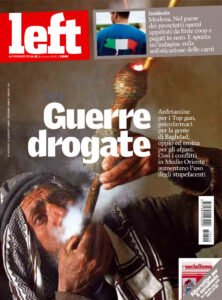by Alessandro de Pascale
The year was 2007. I was doing an internship at Italian NGO Legambiente’s monthly magazine, La Nuova Ecologia (New ecology). I had written my first article in 1996 (as a minor), but at that time, after taking a course in environmental journalism, I was beginning to try to turn my passion into a job. Among the magazines I read at the time was the weekly ‘Left’ (heir to the old ‘Avvenimenti’ of the non-profit organisation l’Altritalia). Its editor-in-chief was Andrea Purgatori (with Alberto Ferrigolo). I had been working for months on a story about the use of drugs in armed conflicts, and I knocked on his door to pitch it to him.
I only knew Purgatori professionally. Since 1976 (before I was born) he had worked as an investigative journalist for Il Corriere della Sera, and over the years he had covered many hot topics: International and Italian terrorism during the “Years of the Lead”; in particular, neo-fascist terrorism and its links with the Italian secret services; the Moro case (a prominent Christian Democrat figure kidnapped and killed by the Red Brigades); and above all, what we in Italy remember as the “Ustica massacre”, in which an Italian passenger plane was shot down in the southern Tyrrhenian Sea by an unidentified aircraft in a peacetime war scenario. The families of the victims will never forget Andrea, I believe, with lifelong gratitude for his constant search for the truth about this event, which took place in 1980 and claimed the lives of 81 people (all civilians).
When I pitched my story to him in the spring of 2007, his eyes lit up. “Beautiful idea,” he told me. “It reminds me of Vietnam, the use of heroin among soldiers and veterans of that conflict,” which Andrea had followed in his time and continued to tell (the last time in June 2020 on “Atlantide”, the in-depth programme he had been directing since 2017 on Italian private television La7). Andrea was used to dealing with conflicts, having covered the war in Lebanon in 1982, the war between Iran and Iraq in the 1980s, the first Gulf War in Baghdad in 1991, the Intifada in Palestine, the uprisings in Tunisia and Algeria.

Without even knowing me, he assigned me Left’s cover story and no less than 14 pages. “You have two weeks to hand it in,” he said. I went home happy, but also terrified by the amount of work and the tight deadline. I had already collected all the information I needed. I just had to organise it in my head and, most importantly, write it. It was published on 1 June 2007 in issue 22 of Left. Over the years I continued to follow the subject and in 2017, exactly ten years later, that cover story became my fourth book and perhaps the one I was most passionate about: ‘Guerra & Droga (War and Drugs)’, published by Castelvecchi in 2017. He loved it. So if I am doing this job today, I also owe it to him, who was one of the first to believe in me and appreciate my work.
About a month ago I heard he was ill. We had last spoken last week. I was about to do a new job for him again, this time on the insurgents in Myanmar, from where I had recently returned. What bad news, his death this morning in a hospital in Rome. Goodbye, Andrea. You will be missed, not only by me, but by those who knew you, your audience, those who loved and respected you, both as a man and as a great and valued investigative journalist.
On the cover photo: Andrea Purgatori at Giffoni Film Festival 2022 © GIO_LE/Shutterstock.com
























